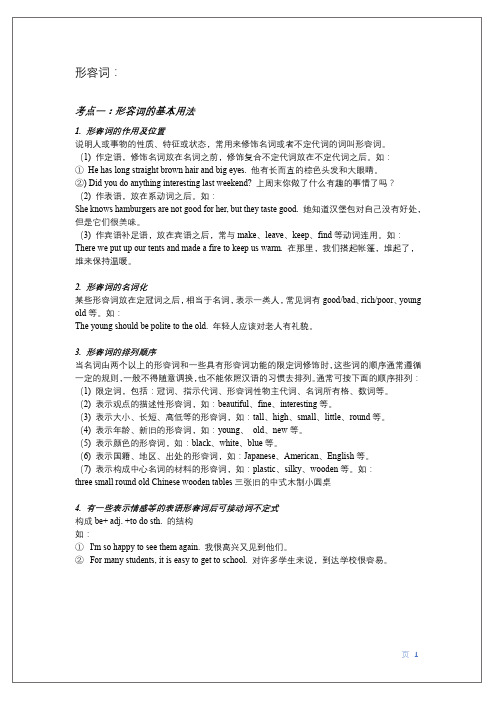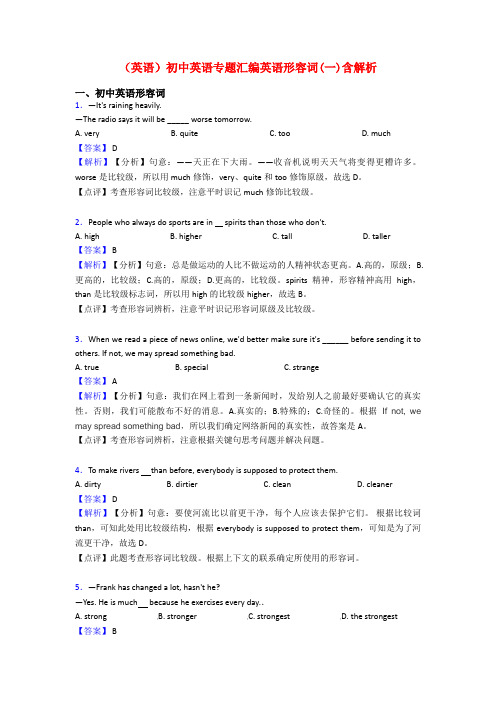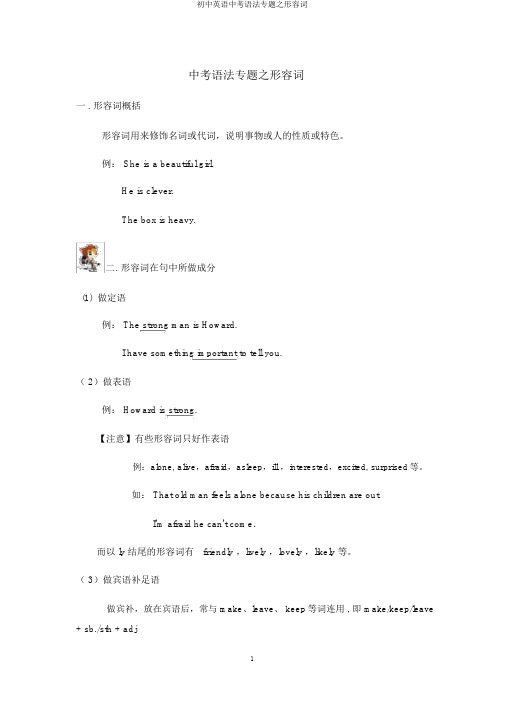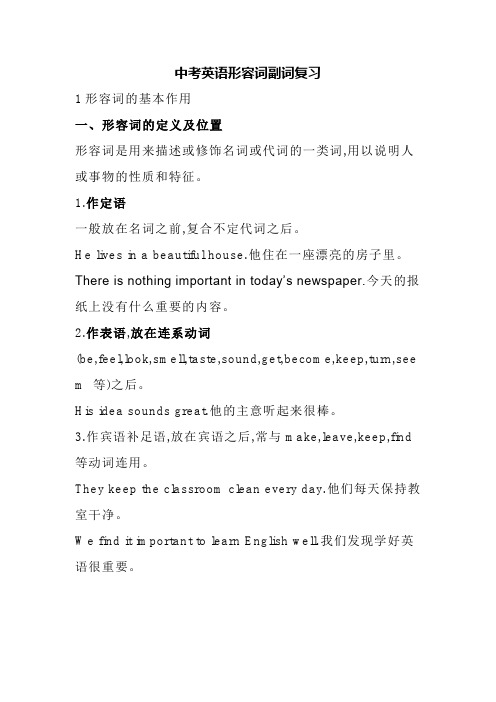初中英语专题复习-形容词
人教版初中英语形容词表汇总

人教版初中英语形容词表汇总Unit 1: Greetings and Introductions- friendly: 友好的- polite: 有礼貌的- shy: 害羞的- confident: 自信的- outgoing: 外向的Unit 2: My School Life- interesting: 有趣的- challenging: 具有挑战性的- busy: 忙碌的- enjoyable: 令人愉快的- stressful: 有压力的Unit 3: Family and Friends- loving: 爱心的- caring: 关心的- supportive: 支持的- understanding: 理解的- reliable: 可靠的Unit 4: My Hobbies- creative: 有创造力的- adventurous: 冒险的- relaxing: 放松的- inspiring: 鼓舞人心的- challenging: 具有挑战性的Unit 5: Daily Routines- busy: 忙碌的- productive: 有成效的- organized: 有条理的- efficient: 高效的- routine: 例行的Unit 6: Animals- cute: 可爱的- intelligent: 聪明的- loyal: 忠诚的- playful: 爱玩的- wild: 野生的Unit 7: Food and Drinks- delicious: 美味的- nutritious: 有营养的- spicy: 辣的- sweet: 甜的- fresh: 新鲜的Unit 8: Traveling- exciting: 兴奋的- breathtaking: 令人叹为观止的- adventurous: 冒险的- memorable: 难忘的- relaxing: 放松的Unit 9: Health and Fitness- healthy: 健康的- energetic: 精力充沛的- active: 积极的- fit: 健康结实的- balanced: 平衡的Unit 10: Festivals and Celebrations- joyful: 欢乐的- festive: 节日的- traditional: 传统的- lively: 热闹的- colorful: 彩色的以上是人教版初中英语形容词表汇总,希望能对你有所帮助。
初中英语语法---形容词

形容词:考点一:形容词的基本用法1. 形容词的作用及位置说明人或事物的性质、特征或状态,常用来修饰名词或者不定代词的词叫形容词。
(1) 作定语,修饰名词放在名词之前,修饰复合不定代词放在不定代词之后。
如:①He has long straight brown hair and big eyes. 他有长而直的棕色头发和大眼睛。
②) Did you do anything interesting last weekend? 上周末你做了什么有趣的事情了吗?(2) 作表语,放在系动词之后。
如:She knows hamburgers are not good for her, but they taste good. 她知道汉堡包对自己没有好处,但是它们很美味。
(3) 作宾语补足语,放在宾语之后,常与make、leave、keep、find等动词连用。
如:There we put up our tents and made a fire to keep us warm. 在那里,我们搭起帐篷,堆起了,堆来保持温暖。
2. 形容词的名词化某些形容词放在定冠词之后,相当于名词,表示一类人,常见词有good/bad、rich/poor、young old等。
如:The young should be polite to the old. 年轻人应该对老人有礼貌。
3. 形容词的排列顺序当名词由两个以上的形容词和一些具有形容词功能的限定词修饰时,这些词的顺序通常遵循一定的规则,一般不得随意调换,也不能依照汉语的习惯去排列。
通常可按下面的顺序排列:(1) 限定词,包括:冠词、指示代词、形容词性物主代词、名词所有格、数词等。
(2) 表示观点的描述性形容词,如:beautiful、fine、interesting等。
(3) 表示大小、长短、高低等的形容词,如:tall、high、small、little、round等。
(英语)初中英语专题汇编英语形容词(一)含解析

(英语)初中英语专题汇编英语形容词(一)含解析一、初中英语形容词1.—It's raining heavily.—The radio says it will be _____ worse tomorrow.A. veryB. quiteC. tooD. much【答案】 D【解析】【分析】句意:——天正在下大雨。
——收音机说明天天气将变得更糟许多。
worse是比较级,所以用much修饰,very、quite和too修饰原级,故选D。
【点评】考查形容词比较级,注意平时识记much修饰比较级。
2.People who always do sports are in spirits than those who don't.A. highB. higherC. tallD. taller【答案】 B【解析】【分析】句意:总是做运动的人比不做运动的人精神状态更高。
A.高的,原级;B.更高的,比较级;C.高的,原级;D.更高的,比较级。
spirits精神,形容精神高用high,than是比较级标志词,所以用high的比较级higher,故选B。
【点评】考查形容词辨析,注意平时识记形容词原级及比较级。
3.When we read a piece of news online, we'd better make sure it's ______ before sending it to others. If not, we may spread something bad.A. trueB. specialC. strange【答案】 A【解析】【分析】句意:我们在网上看到一条新闻时,发给别人之前最好要确认它的真实性。
否则,我们可能散布不好的消息。
A.真实的;B.特殊的;C.奇怪的。
根据If not, we may spread something bad,所以我们确定网络新闻的真实性,故答案是A。
初中英语中考语法专题之形容词

中考语法专题之形容词一 . 形容词概括形容词用来修饰名词或代词,说明事物或人的性质或特色。
例: She is a beautiful girl.He is clever.The box is heavy.二.形容词在句中所做成分(1)做定语例: The strong man is Howard.I have something important to tell you.( 2)做表语例: Howard is strong.【注意】有些形容词只好作表语例:alone, alive,afraid,asleep,ill ,interested,excited, surprised等。
如: That old man feels alone because his children are out.I'm afraid he can't come.而以 ly 结尾的形容词有friendly ,lively ,lovely ,likely 等。
( 3)做宾语补足语做宾补,放在宾语后,常与 make、leave、 keep等词连用 , 即 make/keep/leave + sb./sth + adj例: Howard keeps himself strong.三、形容词与其余词类的地点关系(1) 形容词修饰 something, anything, nothing, everything等不定代词时,形容词放在名词后。
[根源 :例: I have something important to tell you.Is there anything interesting in the film.Can you find anywhere quiet?He has been sent to somewhere particular.Did you see anybody else? 你还看到他人了吗 ?四、某些形容词能够和定冠词连用,表示一类人或事物,其作用相当于一个名词,如: the young(年青人),the poor (穷人),the rich (富人)。
中考英语形容词副词复习

中考英语形容词副词复习1形容词的基本作用一、形容词的定义及位置形容词是用来描述或修饰名词或代词的一类词,用以说明人或事物的性质和特征。
1.作定语一般放在名词之前,复合不定代词之后。
He lives in a beautiful house.他住在一座漂亮的房子里。
There is nothing important in today’s newspaper.今天的报纸上没有什么重要的内容。
2.作表语,放在连系动词(be,feel,look,smell,taste,sound,get,become,keep,turn,see m 等)之后。
His idea sounds great.他的主意听起来很棒。
3.作宾语补足语,放在宾语之后,常与make,leave,keep,find 等动词连用。
They keep the classroom clean every day.他们每天保持教室干净。
We find it important to learn English well.我们发现学好英语很重要。
4.形容词的名词化有些形容词放在定冠词之后变成名词,表示一类人,常见的有:good/bad,rich/poor,young/old,deaf/blind,black/white,livi ng/dead等The old should be taken good care of.老年人应该受到很好的照顾。
2形容词词义辨析中考主要在完形中考查形容词词义辨析。
学生在做辨析题时,首先应读懂句意,抓住题干中关键信息,并分析各选项表达的意思,结合日常生活的常识及语境即可选出正确答案。
如:After the football match, the players were very ______ and tired.A. cool B. full C. lively D. thirsty方法点拨第1步:分析四个选项均为形容词,在句中作表语;第2步:分析语境“在足球比赛之后,运动员是_____和疲劳的。
仁爱版英语七年级上册形容词总结

仁爱版英语七年级上册形容词总结
本文档总结了仁爱版英语七年级上册涉及的形容词及其用法。
形容词一:高兴的
- 用法:用于描述人的情感状态,表示感到快乐、愉悦或满足。
- 例句:I am happy to see you.(见到你我很高兴。
)
形容词二:好吃的
- 用法:用于描述食物,表示美味可口。
- 例句:The cake is delicious.(这个蛋糕很好吃。
)
形容词三:漂亮的
- 用法:用于描述人或事物的外貌,表示外表美观、吸引人。
- 例句:She is a beautiful girl.(她是一个漂亮的女孩。
)
形容词四:聪明的
- 用法:用于描述人的智力,表示智商高、聪明伶俐。
- 例句:He is a smart student.(他是一个聪明的学生。
)
形容词五:忙碌的
- 用法:用于描述人的状态,表示非常忙、没有空闲时间。
- 例句:I have a busy schedule today.(我今天很忙碌。
)
形容词六:有趣的
- 用法:用于描述事物或活动,表示有吸引力、令人感兴趣。
- 例句:The movie is interesting.(这部电影很有趣。
)
以上是仁爱版英语七年级上册中常见的形容词及其用法总结。
希望对你的学习有所帮助。
初中英语语法---形容词和副词含练习
专题复习---形容词和副词〔一〕一、形容词的构成及其用法用以修饰名词等表示人和事物的性质、特征的词叫形容词。
它在句中可以充当定语、表语和宾语补足语,一般放在所修饰词的前面。
Eg. Those big moon cakes are delicious. (作表语)Eg. There are many beautiful flowers in the park. (作定语)1.修饰词尾为-body/-one; -thing不定代词时,必须放在其后。
Eg. There’s nothing wrong with my bike.Eg. Please give me something delicious to eat.Eg. Anybody clever can’t do such stupid things.2.表示长、宽、高、深或年龄的形容词的常用构造:数词+名词+形容词12 years old/ 8meters long/ 3 meters wide/ 100 kilometers high/ 1.8meters tallEg. It’s a river 6 meters deep.Eg. That’s a road 300 kilometers long.Eg. The young man is 1.8 meters tall.3.系动词〔look, sound, smell, taste, feel〕之后要接形容词Eg. The soup tastes nice.Eg. They all looked very happy after hearing the good news.4.–ing形容词和-ed形容词的区别-ed形容词通常用来形容人,而-ing形容词通常用来形容事或物如:disappointed/e*cited/interested/surprised/bored/amazed/rela*ed (*人)感到失望/兴奋/有趣/奇怪/厌烦/震惊/放松disappointing/e*citing/interesting/surprising/boring/amazing /rela*ing〔*事〕令人失望的/兴奋的/有趣的/奇怪的/厌烦的/震惊的/放松的5.“the +局部形容词〞表示“一类人〞the young the old the rich the poor二、副词的构成和用法。
初中英语 - 必背语法——形容词
形容词是用来修饰名词 ,表示人或事物的性质、特征、状况或属性的词 .➤形容词的用法1. 形容词修饰名词时,一般置于它所修饰的名词之前 .如有假设干形容词同时修饰一个名词时,它们的排列顺序较为固定,通常为:冠词或人称代词所有格+数词+性质+大小+形状+表示老少、新旧+颜色+事物质地、人的国籍、用途形容词 .例如:She has beautiful long curly blond hair.他有一头漂亮的金黄色长卷发 .Mary gave me a useful big brown wooden box.玛丽给了我一个实用的褐色大木盒子 .注意:(1)enough修饰名词时,既可以放在名词之前,也可以放在名词之后,但多放在名词前 .例如:Don't worry, we have enough time/time enough to get there.别着急 ,我们有足够的时间赶到那儿 .(2)由连字符连接起来的复合形容词中的名词只能用单数形式 .例如:an eight -year -old boy一个8岁的男孩2. 形容词用作定语 ,修饰由some, any, every, no等构成的复合不定代词时 ,须后置 .例如:Will you please tell us something interesting?你给我们说一些有趣的事好吗 ?Anyone intelligent can do it.任何有智力的人都能做这件事 .3. 形容词用作表语 ,位于系动词之后例如:The park is very beautiful.这座公园很美 .4. 用作宾语补足语 ,紧跟在宾语后面例如:Please keep the classroom clean.请保持教室干净整洁 .➤形容词比拟等级|的形式(1 ) 规那么形式一般说来,单音节词及少数双音节词在后加-er; - -est 来构成比拟级|和最|高级|;其他双音节词及多音节词在前加more, most.如:great -greater -greatestbusy -busier -busiestimportant -more important -(the)most important(2 )不规那么形式good (well) -better -bestbad (ill) -worse -worstmany (much) -more -mostlittle -less -least(3 )形容词比拟等级|的用法①表示两者的比拟 ,用形容词的比拟级| +than. 如:He is cleverer than the other boys.This one is more beautiful than that one.②表示两者以上的比拟 ,用"the +形容词最|高级| ( +名词 ) +of(in) …"如:He is the cleverest boy in his class.③表示两者是同等程度 ,用"as +形容词原级| +as". 如:He is as tall as I.I have as many books as you.④ 越… 越…例如:The more I learn, the happier I am.⑤ You can never be too careful. 越小心越好又如:You can never praise the teacher too highly.你怎么赞扬这个老师也不过分 .。
初中英语语法之形容词的用法-讲解+习题
1.形容词的用法:形容词是指用来修饰、说明名词或不定代词,表示人或物的性质、特征和状态。
一般放在它所修饰的名词前作定语,也可独立作表语或宾语补足语等。
i. 作定语:This is an interesting story. Kitty is a clever cat.ii. 作表语:Yao Ming is very tall. Our classroom is big and bright.iii. 作宾语补足语:Don't make your hands dirty. We're trying to make our school beautiful.注意:a. 有些形容词只能作表语。
如:alone, afraid, asleep等。
如:That old man feels alone because his children are out. I'm afraid he can't come.b. 形容词与不定代词something, anything, nothing, everything等连用时,要放在这些词后面。
如:There is something wrong with my DVD machine. It's nothing serious.c. 某些形容词可以和定冠词连用,表示一类人或事物,其作用相当于一个名词。
如:the young(年轻人),the poor(穷人), the rich(富人)d. 如果有两个以上的形容词修饰同一个名词时,其前后排列顺序一般如下:限定词(a/the, this/some/her……)+数量词(先序数词后基数词)+观点+大小+形状+新旧+颜色+产地+材料+名词。
如:a big old German computer2.副词的用法:副词是用来修饰动词、形容词、其他副词或整个句子,有时也能修饰名词,表示时间、地点、方式、程度、动作、频度等,在句中主要用作状语。
(英语)初中英语专题汇编形容词(一)含解析
(英语)初中英语专题汇编形容词(一)含解析一、初中英语形容词1.Who is one, Tom or Jack?A. the tallerB. the tallC. the tallestD. tall【答案】A【解析】【分析】句意:汤姆和杰克,谁更高?A.the taller更高的,比较级;.the tall高的;C.the tallest最高,最高级形式;D.tall高,原形。
在汤姆和杰克两人之间作比较,用比较级形式。
故选A。
【点评】本题考查形容词比较级,两者之间做比较就用比较级。
2.Julie takes good care of the family dog. She is ________ than her brother.A. patientB. more patientC. most patientD. the most patient【答案】 B【解析】【分析】句意:Julie把他家的狗照顾都很好。
她比她的的哥哥更有耐心。
A.耐心的;B.更有耐心的;C.表达不存在;D.最有耐心的。
根据than,可知用形容词的比较级,patient,有耐心的,其比较级是more patient,故选B。
【点评】考查形容词的比较级。
注意比较级的用法。
3.—You haven't said a ________ word since last Friday. What's wrong?—Nothing. Just leave me alone.A. simpleB. singleC. similarD. silent【答案】 B【解析】【分析】句意:——自从上周五你没有说一句话,怎么了?——没事,仅仅让我单独待会。
A.简单的;B.单一的;C.相似的;D.沉默的。
根据Just leave me alone.仅仅让我单独待会,可知没有说一句话,say a single word,说一句话,故选B。
- 1、下载文档前请自行甄别文档内容的完整性,平台不提供额外的编辑、内容补充、找答案等附加服务。
- 2、"仅部分预览"的文档,不可在线预览部分如存在完整性等问题,可反馈申请退款(可完整预览的文档不适用该条件!)。
- 3、如文档侵犯您的权益,请联系客服反馈,我们会尽快为您处理(人工客服工作时间:9:00-18:30)。
初中英语专题复习七Topic 1 形容词(adj.)1.形容词即是表示人或物的特征、性质或状态,修饰名词或不定代词的词。
(考点1)①作定语,放在名词之前,不定代词之后(公式:adj.+n.)但少数形容词只能作表语如:alone, afraid, asleep, awake, alive, well等eg: I have something important to tell you.Don’t be afraid.②作表语,放在系动词之后eg: He looks happy.③作宾语,放在宾语之后,常与make,leave,keep等动词连用。
eg: You must keepyour eyes closed.2.形容词的名词化(考点2)某些形容词放在定冠词后,变成名词,表示一类人。
常见的有good/bad, rich/poor,young/old, deaf/blind,black/white,living/dead等eg:The young should be polite to the old.年轻人应该对老人有礼貌。
3)顺序:限定词+数量形容词(序前,基后)+性状形+大小、长短、高低等形体+新旧+颜色+国籍+材料如:two round blue plastic plates两个圆形的蓝色塑料盘4.名词变形容词的方法(记单词的方法)(考点4)①后加y/ny:cloud-clody,sun-sunny②后加ern:west-western,③表称谓和表示时间的名词后加ly:friend-friendly④表物质的名词,后加en/y:wood-wooden, salt-salty⑤表抽象意义的名词后加ful/y/less:care-careful/careless, luck-lucky,⑥表示大州与国家的名词后加n:Aisa-Aisan6.形容词比较级的变化(考点5)①一般情况下,直接加er/est; 如young-younger-youngest②以不发音的字母e结尾,后加r/st; 如wide-wider-widest③以元音字母+辅音字母结尾的,先双写这个辅音字母再加er/est如big-bigger-biggest, thin-thinner-thinnest,red-redder-reddest④以辅音字母y结尾的词,先变y为i,再加er或est;如:heavy-heavier-heaviest, busy-busier-busiest⑤双音节或多音节在前加more或the most如:important-more important-the most important⑥不规则变化“一好一坏”,“一多一少”“一远和一老”good/well-better-best bad/badly/ill—wrose—worstmany/much—more—most little—less—leastfar—farther/further—farthest/furthest old—older/elder—oldest/eldest比较级:两者进行比较(than),最高级是三者或三者以上进行比较(in)7.辨析(考点6)①-ing形容词和-ed形容词-ing形容词表示“令人…”,主语通常是物;-ed形容词表示“感到…”主语通常是人。
如:This is a surprising story. I am surprised at the news.②形容词最高级前不加the的情况,如果形容词最高级前有物主代词、指示代词、名词所有格时不必加the。
如:Monday is my busiest day.8.哪些单词是形容词?(考点7)1.-able:enjoyable愉快changeable,drinkable,comfortable2.al: cultural, personal, musical, actual,medical,natural,special, usual3.-an:African非洲人的4.-ble:possible可能的terrible5.-ful:useful有用的hopeful,helpful,thankful,fearful6.-ing:exciting令人兴奋的-ing 词尾“-ing”也可构成形容词,但这种形容词实际上是现在分词形容词化了,因此,此类形容词表示主动。
dying, interesting, living, exciting-ed:interested, excited7.-ive:active积极的8.-less:useless无用的harmless,hopeless homeless9.-y/-ly/-ish:lucky幸运的meaty,hairy,leafy,wateryfoolish,friendly, lovely,lonely, likely10. –ous: curious,famous,dangerous,serious,various形容词专项训练:1. This box is_________ that one.A. heavy thanB. so heavy thanC. heavier asD.as heavy as2. When we speak to people, we should be ______.A. as polite as possibleB. as polite as possiblyC. as politely as possibleD. as politely as possibly3. This book is____ that one, but____ than that one.A. as difficult as; expensiveB. as more difficult as; more expensiveC. as difficult as; more expensiveD. more difficult as; as expensive4. I think the story is not so ______ as that one.A. interestingB. interestedC. more interestingD. most interesting5. I think science is _________ than Japanese.A. much importantB. importantC. much more importantD. more much important6. This pencil is_________ than that one.A. longestB. longC. longerD. as long7. My mother is no __________ young.A. shorterB. longerC. littleD. few8. These children are ______ this year than they were last year.A. more tallB. more tallerC. very tallerD. much taller9. Mrs Black has got______ instead of getting any better.A、more bad B. a little worse C. much badly D. a lot of worse10. When we arrived, we found the meeting room crowded with______ students.A. quite a fewB. only a fewC. fewD. a few quite11. The house is_____ small for a family of six.A. much tooB. too muchC. very muchD.so12. Through the window we can see nothing but ____ buildings.A. tall very manyB. very many tallC. very tall manyD. many very tall13. —What's your brother like?—He is___________.A. a driverB. very tallC. my friendD. at school14. The jacket was so______ that he decided to buy it.A. muchB. littleC. expensiveD. cheap15. Our classroom is_______ larger than theirs.A. moreB. quiteC. veryD. much16. The earth is about_______ as the moon.A.as fifty time bigB.fifty times as bigC. as big fifty timesD. fifty as times big17. Your room is_______________ mine.A.twice as large thanB. twice the size ofC.bigger twice thanD.as twice large as18. Your room is _____ than mine.A. three time bigB. three times bigC. three times biggerD. bigger three times19. His father is_______than his mother. ;A. older four yearsB. as four years olderC. four years olderD. bigger four years20. Maths is more popular than_______.A. any other subjectB. all the subjectsC. any subjectD. other subject写出下列形容词的比较级和最高级:1. long _________ _________2. short _________ _________3. big _________ _________4. early _________ _________5. nice _________ _________6. fat _________ _________7. strong _________ _________ 8. clean _________ _________9. busy _________ _________ 10. thin _________ _________11. tall _________ _________ 12. late _________ _________13. hot _________ _________ 14. happy _________ _________15. delicious ________________ ________________16. beautiful ________________ ________________17. interesting ________________ ________________18. important ________________ ________________19. popular ________________ ________________20. expensive ________________ ________________用下列词的适当形式填空:1. She is _________ (tall) than me.2. This ball is _________ (big) than that one.3. I’m _________ (thin) than you.4. This girl is ________ ________ (beautiful) than that one.5. Cookies are ________ ________ (delicious) than bread.6. The pig is ________ (fat) than the dog.7. The pen is ________ ________ (expensive) than the pencil.8. The boy is ________ (old) than the girl.9. This building is ________ (high) than that one.10. The boy is ________ (short) than me.。
